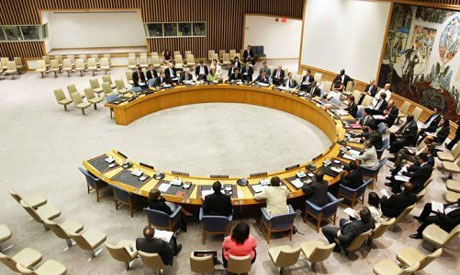
UN Security Council (AFP photo)
Pakistan, Morocco, Guatemala and Togo all won two-year terms on the 15 member UN Security Council on Friday. Nine rounds of voting were held for a seat for Eastern Europe, but neither Azerbaijan nor Slovenia could get the required two-thirds majority. The new countries will replace Bosnia, Brazil, Gabon, Lebanon and Nigeria on the council from January 1.
The presence of India and Pakistan together is startling because of their rivalry as nuclear powers who have fought three wars since 1947. Pakistan has also been warned by the United States, one of the five permanent council members, about militant groups operating from Pakistani territory.
Morocco's victory is sensitive because it is not a member of the African Union and due to the deadlock over the disputed territory of Western Sahara which it annexed in 1976.
Pakistan is expected to side with China, Brazil, South Africa and India in opposing any efforts by the United States and its allies to sanction Syria or Iran.
Diplomats said India, which will remain on the council through 2012, and Pakistan could work with each other and Pakistan's UN envoy, Abdullah Hussain Haroon, played down fears of friction. The two have already served together on the UN's most powerful body.
Haroon said Pakistan would fight for the "underdogs" and added: "Hopefully we will be working with all the other members of the Security Council, especially India." He said he had a good working relationship with India's UN envoy, Hardeep Singh Puri. "You have seen that the usual tendencies have not erupted between us and that is a good factor," he said.
"Perhaps both of us have been beneficial in starting dialogue between both the countries."
The Pakistan envoy acknowledged differences with the United States over militant groups such as the Haqqani network, which Washington has insisted should be broken up. "We have our points of view and I think the best we can do is sit together and talk and resolve these issues," he said. "I don't think there are going to be any winners in anything that comes into a larger conflagration."
The African Union backed Mauritania and Togo against Morocco in the contest for two African seats. Morocco, strongly backed by France, conducted a strong campaign however to get a seat.
Foreign Minister Taieb Fassi Fihri said Morocco was "extremely honored" by the support it had received "despite the adversity, despite the attempts made in vain to exclude Morocco from this contest under the pretext that it did not belong to a certain continental organization."
"The African Union wanted to impose just two candidates, by excluding Morocco. And today, a large majority of African nations decided to show solidarity with Morocco," he said. He insisted there should be no link to the deadlock over Western Sahara.
There has been a UN-brokered ceasefire with separatist rebels since 1991. But some African Union nations want stronger UN efforts to organize a promised self-determination referendum.
Pakistan won the Asia-Pacific seat, getting 129 votes, the minimum required, to 55 for its only rival Kyrgyzstan.
Morocco secured 151 votes to take one of the African seats in the first round. It will also become the Arab representative on the council on January 1.
Togo took the second African seat in the third round of voting when it secured 131 votes to 61 for Mauritania.
Guatemala secured its seat unopposed, although two countries abstained. In the race for a seat for Eastern Europe, Azerbaijan (74 votes), Slovenia (67) and Hungary (52) fell well short of the required majority in the first round.
Hungary dropped out and in the ninth round, Azerbaijan had 113 votes to Slovenia's 77. Diplomats said there could be a backlash against adding another European Union member to the council where Britain, France, Germany and Portugal already hold seats.
Late Friday, the General Assembly called off the contest until Monday. The battle is far from the UN record in 1979 when 155 rounds of voting were needed over several weeks before Mexico secured a seat for Latin America on the council.
Short link: